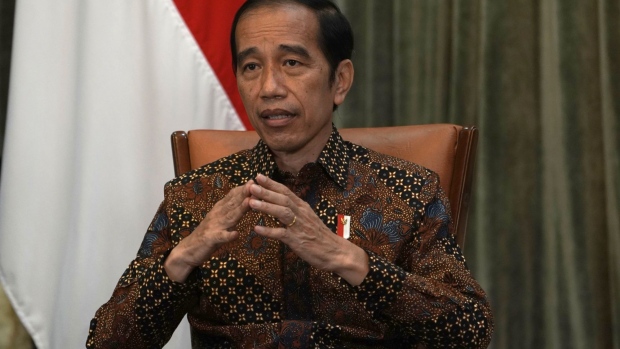Aug 15, 2022
Indonesia Latest: Jokowi to Focus on Economy in Policy Speech
, Bloomberg News

(Bloomberg) -- Indonesia seeks to narrow next year’s budget deficit to below 3% of gross domestic product for the first time since 2019 as it balances the need to rein in the fiscal sector while supporting growth, President Joko Widodo said.
The fiscal gap is projected to drop to 2.85% of GDP in 2023 from an estimated shortfall equivalent to 3.92% of GDP in 2022 even as the government increases the allocation for subsidy by 4.4% to 297.2 trillion rupiah ($20.1 billion), said Jokowi, as the president is popularly known, in his annual budget speech to the parliament.
Southeast Asia’s largest economy is forecast to expand 5.3% in 2023, Jokowi said. That compares with the government’s estimate of a 5.1%-5.4% gross domestic product growth for this year while inflation, which hovers near a seven-year high, is seen to ease to 3.3% in 2023 from the government’s projected range of 4%-4.8% this year.
Bulk of the subsidy budget for 2023 will be spent on energy -- fuel, LPG and electricity -- at 210.7 trillion rupiah, up slightly from from 208.9 trillion rupiah this year.
“Moving forward, we have to stay vigilant. The risks from global economic turbulence remain high,” the president said. “The slowdown of the global economy continues to have the potential to affect the rate of short-term national economic growth.”
Key Developments
- Jokowi Set to Unveil Strict Budget Plans Amid Soaring Subsidies
- Everyday Inflation Creeps Up in One of World’s Few Rate Holdouts
- The US-Led Drive to Isolate Russia and China Is Falling Short
All times Jakarta
Indonesia to Lower Healthcare Spending (3:31 p.m.)
Government plans to lower its spending on healthcare to 169.8 trillion rupiah. State spending for 2023 planned at 3,041.7 trillion rupiah.
2023 Gives Momentum for Fiscal Consolidation (3:28 p.m.)
The year 2023 will give Indonesia momentum to carry out fiscal consolidation while maintaining a balance between countercyclical capability with efforts to control financial risks.
Rupiah to Average 14,750, 10-Year Yield to Average 7.9% (3:22)
The local currency is seen to average at 14,750 per US dollar in 2023 while 10-year government bond yield expected at 7.9% in 2023.
Indonesia Issues Decree to Settle Past Human Rights Violations (12:24 p.m.)
Jokowi has signed a presidential decree that help resolve past cases of human rights violations. The decree enables the establishment of a new team to settle past abuses.
Indonesia’s New Capital to be Engine of New Economy (12:08 p.m.)
Nusantara, Indonesia’s new capital, will become the engine of the country’s new economy. The capital city is not only meant to house government offices, but it’s also for innovators and entrepreneurs, said Jokowi said.
Indonesia to Strengthen Civil Rights Protection(11:04 p.m.)
The country has to continue to strengthen civil rights, democratic practices as well as political rights for women and marginalized groups, Jokowi said. The law must be enforced fairly and without discrimination.
Indonesia Needs to Boost Downstream Industry (11:00 a.m.)
The country needs to bolster development in its downstream industry as well as produce high-value commodities, President Jokowi said. It will push for bauxite, copper and tin downstreaming, he said. Indonesia’s nickel-based exports to reach 440 trillion rupiah in 2022, he added.
Jokowi Begins Address, Touts Economic Fundamentals (10:53 a.m.)
The country’s economic fundamentals remain sound amid the turbulent global economy, Jokowi said. Indonesia has to remain vigilant of the macroeconomic headwinds, it has to continue to pursue its economic agenda, he added.
Southeast Asia’s largest economy has controlled inflation at around 4.9%, Jokowi said. That’s far below the average inflation of around 7% within the Association of Southeast Asian Nations bloc. It’s also far below the the inflation of developed countries which of around 9%.
Indonesia Mulls Raising Fuel Prices, Bisnis Says (8:56 a.m.)
Indonesia is considering to raise prices of Pertalite -- the nation’s most commonly used gasoline -- and diesel as higher global crude oil prices bloat the government’s spending on subsidies, Bisnis Indonesia reports, citing Arifin Tasrif, the energy and mineral resources minister.
The report came ahead of Jokowi’s policy speech.
The country is spending to absorb higher energy costs is hitting a record of 502.4 trillion rupiah ($34 billion) this year, taking up 17% of the state expenditure.
©2022 Bloomberg L.P.







